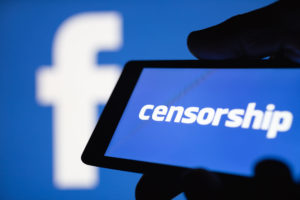Section 230 of The Communications Decency Act of 1996 protects tech companies from being held liable for content posted by users. If someone posts something illegal on social media, leading technology companies like Facebook and Twitter are not held responsible. However, thanks to U.S. Senator Josh Hawley, these laws may begin to change.
–
New Legislation Would Make Social Media Companies Liable for User Generated Content
It’s no secret that social media and the Internet have a huge impact on society. So much so, that elections and mass-shootings can be influenced by the power of Facebook and Twitter.
[ SEE: Social Media Used As A Weapon ]In fact, even the CEO of Facebook himself has asked governments to have a more active role in updating laws regarding the Internet, according to Mark Zuckerberg’s op-ed piece in The Washington Post. However, I’m not sure holding big tech accountable for the content users post is what he had in mind.
According to Forbes, Josh Hawley’s proposal for new legislation would remove the immunity given to big tech companies under Section 230 of the 1996 Communications Decency Act. Instead, companies will need to submit audits biannually to the FTC that will prove their content-removal process and algorithms are politically-neutral in order to break free from their loss of protection.
“With Section 230,” Hawley said in a statement published by Forbes, “tech companies get a sweetheart deal that no other industry enjoys—complete exemption from traditional publisher liability in exchange for providing a forum free of political censorship. Unfortunately, and unsurprisingly, big tech has failed to hold up its end of the bargain.”
Interestingly enough, this proposal directly targets companies like Facebook and Twitter. This is because it would only apply to companies who have more than $500 million in global annual revenue or companies with more than 30 million active monthly users in the U.S. and 300 million globally, according to Forbes.
Those against this proposal believe that the protections under Section 230 allows people to freely express their views and opinions without fear of the government policing what can and cannot be said. Some also believe that politicians have underlying motives to making these types of changes.
Others, like Hawley, agree that Big Tech has become too powerful. Many would prefer to have the government policing content rather than having CEOs decide what can stay and what is removed.
Thoughts on Section 230 From a Legal Perspective
“They couldn’t care less about small businesses who’ve been victimized by defamation and are left without any remedy, even though the problem is extremely simple to solve: require websites to remove content when presented with a valid judgement and make the website liable for fees and costs when they fail to comply (similar to the Digital Millennium Copyright Act ),” says Daniel Warner of RM Warner Law.
“It’s ridiculous that intellectual property rights in this country are valued more highly that one’s reputation.” Dan Warner emphasized that, “for many people in this country, a person’s ability to earn a living is determined by the individual’s ostensible reputation online.” While Dan Warner agrees that Big Tech has become too powerful, “Section 230 is broken and has been broken for a very long time, but the problem is not just limited to ‘political speech’ and Big Tech. The law has been abused and will continue to be abused by people and companies big and small until it is changed. The fact that these companies can decide whether or not to honor a legitimate judgement from a court in the United States undermines our legal system and its utility, and encourages people to take matters in their own hands and/or engage in conduct that should not be encouraged in our society. If a judgement declares certain content to be defamatory and/or not protected speech, websites should be required to remove the content.”
What do you think? Should Big Tech be held accountable or should the users be held accountable for the content they post?
What To Do If You’ve Been Defamed
If you are being defamed, cyberbullied, or threatened on social media or the Internet in general, contact the Internet attorneys at RM Warner Law. We can guide you through the path to justice. Get in touch today.





Leave a Reply
Your email is safe with us.